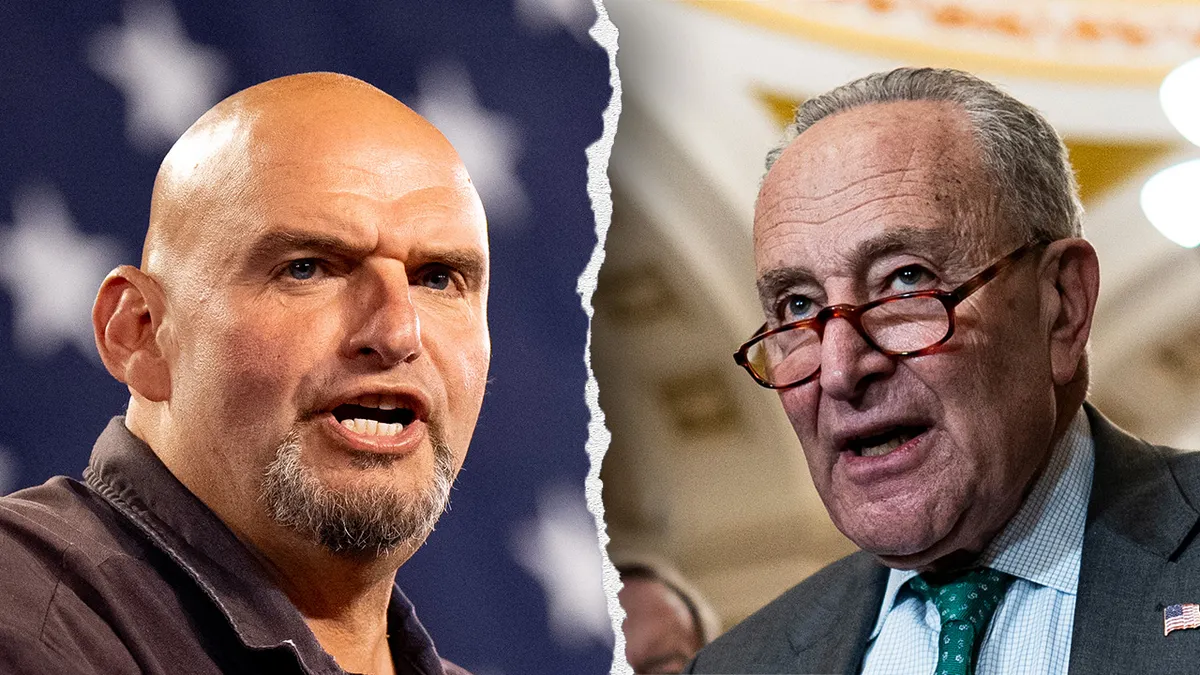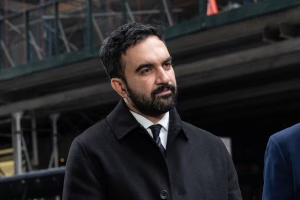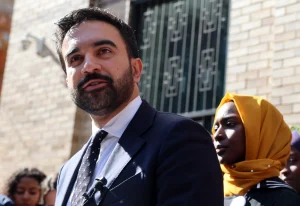In Washington, moments of quiet honesty are rare. Yet this week, one Democratic senator managed to spark a wave of conversations — not for a fiery speech or partisan attack, but for a surprisingly direct answer that left many in his own party uneasy.
During a week already defined by a tense government shutdown and internal divisions, Senator John Fetterman of Pennsylvania sat for a routine television interview that turned into something much larger. What began as a discussion about votes and procedure ended with a few sentences now echoing across Capitol Hill.
At issue was the question of leadership — specifically, who is guiding Democrats through a difficult moment when government funding, party unity, and public confidence all hang in the balance.
Fetterman, often known for his plainspoken approach, offered an answer that some viewed as a quiet rebuke, others as a moment of truth. His response was brief, but it captured a mood spreading among lawmakers and voters alike: a growing sense of uncertainty about where the Democratic Party is headed and who is steering it.
A Party Searching for Direction
The backdrop for his remarks was the ongoing standoff that brought parts of the federal government to a halt. As negotiations dragged on, frustration grew inside both parties. Democrats blamed Republicans for using the budget as leverage; Republicans accused Democrats of prioritizing political optics over public service.
Some senators, weary of the stalemate, began signaling they would cross party lines to reopen the government. Among them was Fetterman — a first-term senator who, despite his progressive roots, has occasionally broken with his caucus when he felt the political games went too far.
In his recent interview, he didn’t name names. But his tone was unmistakable. He spoke about the need to “do the right thing,” even if it meant standing apart from his own side.
Political observers took notice. “He’s emerging as a voice that doesn’t always follow the script,” said one Democratic strategist who requested anonymity. “That can be refreshing — and uncomfortable — for leadership.”
The Leadership Question
What truly caught attention, though, wasn’t his policy stance. It was a moment when Fetterman was asked who, exactly, was leading Democrats during the standoff.
Instead of offering the expected answer, the senator paused. Then, with a half-smile, he replied in a way that surprised even the interviewers.
He didn’t point to a person. He didn’t offer a slogan. He simply suggested that the answer might not be so clear.
Within hours, the comment was circulating online. Some saw it as criticism of the party’s top figures. Others read it as a broader observation about a political movement that, despite holding major influence in Washington, appears uncertain about its future direction.
“It’s not an attack,” said one senior aide familiar with Fetterman’s thinking. “He’s saying out loud what a lot of people are quietly wondering — who is defining what Democrats stand for right now?”
Tensions Beneath the Surface
Behind closed doors, members of both parties acknowledge that the shutdown fight revealed deeper rifts. For Democrats, it exposed a difficult balancing act between progressive priorities and centrist pragmatism. For Republicans, it showed that opposition alone isn’t a governing strategy.
Fetterman’s comment, though short, landed squarely in that context. It came from someone who, despite his populist image, has often tried to bridge divides — sometimes irritating both sides in the process.
His aides insist he wasn’t trying to embarrass anyone. “John speaks from the gut,” said one longtime staffer. “He’s not looking for headlines — he’s just allergic to Washington double-talk.”
Yet in the capital’s careful language, even a straightforward remark can ripple far beyond its intent.
Reaction Across the Aisle
Republicans, predictably, seized on Fetterman’s words to portray Democrats as divided. Conservative commentators called it “proof of confusion at the top,” while progressive activists insisted he’d been taken out of context.
Privately, some Democratic officials expressed irritation that the exchange overshadowed the party’s broader message. Others quietly admitted it struck a chord.
“Voters want clarity,” one strategist said. “They don’t want to feel like the party’s on autopilot.”
Political analysts note that the senator’s rising national profile gives his statements more weight than before. Once seen as a fringe progressive, he’s now being cited as one of the few willing to challenge his party from within.
From the Grassroots to the Spotlight
Fetterman’s journey to the Senate was unconventional — from small-town mayor to lieutenant governor to a national figure often defined as much by his authenticity as by his politics.
In recent months, he’s publicly criticized both parties for prioritizing short-term wins over long-term solutions. His votes have at times aligned him with Republicans, but he continues to identify as a Democrat who wants the party to “broaden its tent” rather than narrow it.
That message, echoed again in this latest interview, may explain why his offhand remark about leadership drew so much attention. It touched a nerve — not because it was harsh, but because it felt honest.
The Broader Picture
Political insiders say the real significance of Fetterman’s comment isn’t about any single person or policy. It’s about what it reveals: a moment of introspection for a party that has struggled to define its post-Biden identity, balance its ideological wings, and reconnect with disillusioned voters.
Whether intentional or not, his words served as a mirror — reflecting uncertainty that goes beyond one senator, one shutdown, or one vote.
As Washington prepares for another election cycle, questions about leadership and direction are not limited to one side of the aisle. But for Democrats, Fetterman’s plainspoken observation may be the reminder they didn’t ask for — and can’t easily ignore.

Emily Johnson is a critically acclaimed essayist and novelist known for her thought-provoking works centered on feminism, women’s rights, and modern relationships. Born and raised in Portland, Oregon, Emily grew up with a deep love of books, often spending her afternoons at her local library. She went on to study literature and gender studies at UCLA, where she became deeply involved in activism and began publishing essays in campus journals. Her debut essay collection, Voices Unbound, struck a chord with readers nationwide for its fearless exploration of gender dynamics, identity, and the challenges faced by women in contemporary society. Emily later transitioned into fiction, writing novels that balance compelling storytelling with social commentary. Her protagonists are often strong, multidimensional women navigating love, ambition, and the struggles of everyday life, making her a favorite among readers who crave authentic, relatable narratives. Critics praise her ability to merge personal intimacy with universal themes. Off the page, Emily is an advocate for women in publishing, leading workshops that encourage young female writers to embrace their voices. She lives in Seattle with her partner and two rescue cats, where she continues to write, teach, and inspire a new generation of storytellers.









